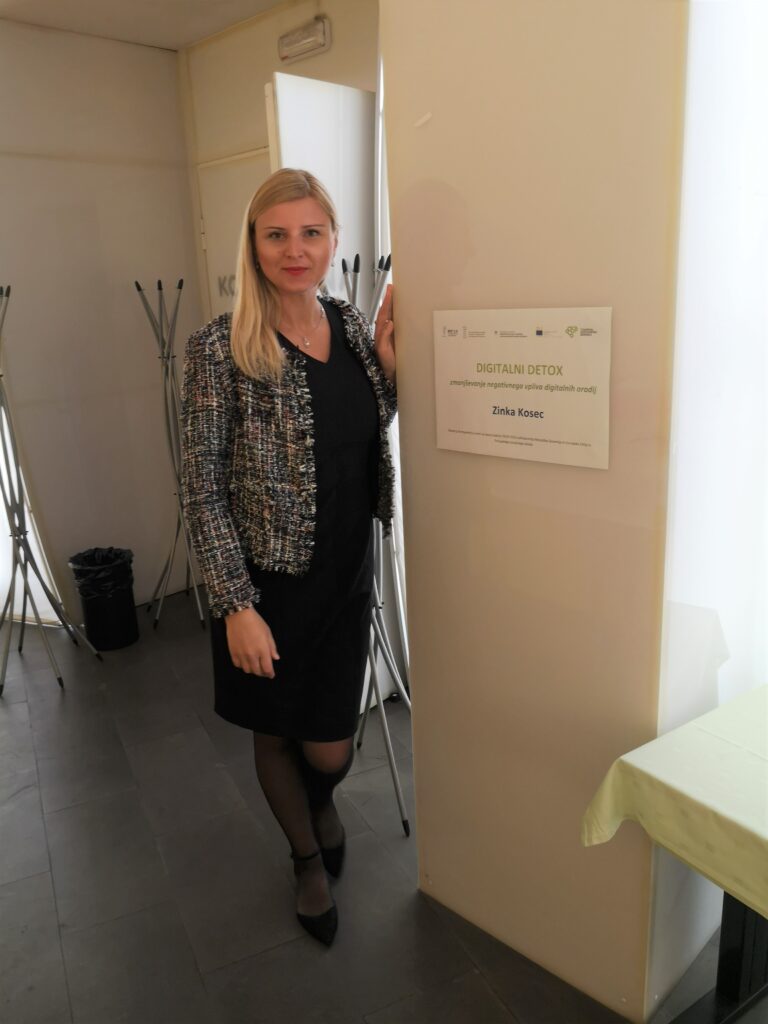All employers want to have professionally trained, motivated and self-initiated employees. And how do they ensure that employees like coming to work or that their only motive is not just the pay check? Why is it good to make sure that we have satisfied employees who are employed in our company? All we often hear is that more and more employees are absent from work due to various illnesses related to stress at work, many of whom are partially retired with disabilities. Is it really impossible for a company to ensure that an employee feels comfortable in his or her working environment? These are just some of the questions we asked Zinka Kosec, a lecturer of the subject Counselling for well-being at the Higher Vocational College for Cosmetics and Wellness Ljubljana (VSŠKV).
Your list of activities is quite extensive. You are a lecturer of the subject of Counselling for well-being at VSŠKV, and you lecture at other schools and institutions. You are also designing corporate wellness programs, which is an area that is less talked about in Slovenia. You have also published a Wellness Counselling textbook. Can you tell us more about yourself and your career or the areas in which you work?
I am currently intensively devoting myself to completing my doctoral studies, where I am researching the impact of predictors on workplace performance. These predictors are: satisfaction (with life and work), well-being, physical activity, hydration and stress. The task is extremely complex and covers a very wide area, so it takes me a really long time. However, extremely interesting results are emerging.
Also, I am intensively involved in raising public awareness of the excessive use of digital tools (Digital Detox program). Although digital tools have provided much good during times of social distancing, this has led many to overuse and, above all, much lower productivity. The average smartphone user spends 5.7 hours a day with it in hand, of which two hours at work. Your phone knows more about you today than you know yourself. The hunt for these information is globally extremely strong. That is why, Slovenia also “earned” the visit of US Secretary of State Michael Pompeo, who is chasing his information territory in a strong fight against the Chinese giant Huawei. I don’t think we are fully aware of what this means.
Of course, I am primarily a mother, wellness in the family is the biggest challenge of life.
A slightly provocative question: Why should companies implement workplace wellness programs?
Depends on who is asking. If the director, I tell them because it pays off for the company. In fact, individuals who feel good at work are also more productive. If the staff member asks: because it will have less fluctuations, sick leave, mistakes and injuries at work. If an employee asks, I answer them because it is a preventive care for them and their health and they will be able to have a quality age. If the president of the country asks: because it is good for society.
Denmark has already started working towards making people’s happiness as important as GDP. I believe that such a program can be prepared and implemented for Slovenia as well. The possibilities are remarkable due to our natural endowments.
A worker who does not feel good in his workplace, who has no motivation and does his job only because he has to, because everyone needs a job or money to survive, is a worker who faces constant (perhaps unconscious) stress. Stress, of course, has a negative effect on health, which means that such a worker will often be on sick leave. What should the company do to prevent this from happening?
We have to see the truth and admit that we have many such employees in Slovenia. High real estate prices require loans. Loans require repayment of monthly instalments and these require a salary. This burden is borne by many Slovenes. That is why we need to help them, even in jobs where work is not the most “wellness”. Wellness is not a place, but a feeling.
What to transfer to the work environment depends greatly on the nature of the work and the individuals in the team. If I give some general instructions, I would say that this is definitely quality food, breaks (even for non-smokers)… It was discovered that it means a lot to employees if they can create their own schedule, there are additional contents to maintain good physical and mental condition of the employee, pleasant corners for socializing. As an example: it was found out that it is more important for employees who they work with than what they do – so they should co-create a schedule. They need to be involved in co-creating the work process, given that they are in it every day, they also know it well. The employee will be motivated and engaged in work for that employer where he will feel accepted, important, heard and useful.
Overload and stress are very exhausting for a person in the long run, so it is necessary to monitor the team and improve such conditions as soon as possible. It is a fact, however, that they occur. Everywhere. There is nothing wrong if they occur, it is wrong if after nothing is done to resolve them!
Do most companies prefer to deal with the elimination of the consequences of an unhealthy work environment or its curative rather than prevention?
This is highly dependent on the long-term plans of management and owners. According to the law, everyone should at least deal with the promotion of health in the workplace and regular medical examinations in the framework of Occupational, Traffic and Sports Medicine. Given that health promotion in Slovenia (prevention) has not yet been seriously monitored by the authorities, we can only speculate about the real situation. In the companies I have been present in, I can say that they work enormously on prevention, systematically and within the means at their disposal, they often do the impossible. But I also know that there are many companies that do not have the time (or money or staff) to deal with this, because it is not necessary, because when a person can no longer do it, they hire another and do not even deal with curative, let alone prevention.
Unfortunately, I must point out that individuals are sometimes such that they are not interested in it or that it represents an additional effort that they are not willing to invest. For example, in a seminar, they first ask when it will end, or if they can just sign. Would you just sign? Seriously? It’s about your health! In such cases, I sometimes become very sad.
What do you think companies should do to improve the well-being of their employees in the workplace?
When we want to improve the well-being of the team, it is very important to take the content very seriously, because the most important thing is to gain the affection of employees so that they will be happy to participate in the program later. The most important thing, then, is to consult and communicate with them at all times about the design of the process. After all, when we do not provide information, it is (of course only seemingly) interpreted by the employees themselves – most often as follows: “The bosses want more/faster/better work” and are therefore against the program in advance.
So when we want to improve the well-being of employees in a company, we check it through five areas of well-being: physical, emotional, mental, social and spiritual. Then we start designing the program. Most often on the principle of “weakest link”. However, if we are tackling such content for the first time in a particular organization, we want people to feel confident and happy with the content, so we tackle the area that is strongest and strengthen other areas through it, as participants feel confident, capable. , important and safe and prefer to be involved in the program and are also more engaged in it.
I often talk to workers from various Slovenian companies. Most of them complain about the behaviour of their superiors, poor salaries, working conditions and I could go on and on. And quite a few of them are looking for another job, despite the fact that they like to do their job and would “bloom” in better working conditions in their position. What do you advise managers in such cases? Is it possible to usually resolve the situation in favour of the worker?
The answer is so simple that many cannot take it seriously, and that is HONESTY. Honesty in relationships, interests, desires, desires, expectations. When we put the cards on the table and when the masks fall, we are what we are. Then we can realistically talk to our colleagues about the situation in the team. However, if we have to wear a mask every day, we spend a lot of our energy on it, which we then have neither for work (we do worse than we could – and give the boss a reason to criticize us even more!) Nor for the family because we feel guilty because we are not good partners / parents), let alone for ourselves. As a result, we lose confidence and begin to believe that this is really what we are capable of and deserve. But then we often really don’t have the power to change anymore. Therefore, three things are important: whether we clarify the situation, if possible, or that we are in such an environment for as little time as possible, but if we have no other choice, try to distance ourselves as much as possible emotionally and regularly release these tensions and systematically bring other joys that fill us with energy.
If the company implements a well-being program at the workplace, what are the advantages or results of such programs for the company and for the employee? What about weak points or negative effects?
The advantages are: lower turnover, less absenteeism, greater engagement at work, better company climate, higher employee satisfaction factor, stronger employee interpersonal connections, better employee health, greater employee loyalty to the organization, better employee opinion about their organization, better employer reputation…
I would highlight another special advantage: it is the stability of the collective. When we plan a business year, we usually assume that everything will run on a steady track, and then the crown comes and turns everything upside down. An individual who feels good in the work environment is mentally stronger even in unforeseen situations and is able to react appropriately and carry out work tasks even in a changed environment / scope / pace. So caring for the well-being of employees actually means caring for the stability of the implementation of the work process.
With the negative effects, however, I might point out a few things:
– To appropriately select content for group performance (where support from fellow human beings is important – for example, communication in the workplace) and individually (such as smoking cessation). You will certainly not be successful if you say, “From tomorrow onwards, we will support all of our employed smokers in quitting smoking.” It is similar with overweight reduction programs.
– If the program is unprofessionally managed, it can happen that individuals develop some stronger emotional traumas, which need to be addressed appropriately professionally, and it is even more important to establish a “field of confidentiality” from the beginning, where exposed content is the program is never used for subsequent billing between employees.
– Longer-term programs must be monitored at all times, as it often happens that if the content is determined too long-term and this is not monitored, the number of participants decreases.
How do you estimate that Slovenian companies take care of their employees compared to other countries in the European Union?
I honestly believe that we have many individuals with very advanced thinking about caring for employees. Some of these also have some potential to make these ideas a reality. A good example is the NLB – Healthy Bank program. However, many of them cannot use their knowledge here, so they go abroad. Young people in particular have no problem with this today.
In Slovenia, I would even point out something else – strong individualism, where everyone takes more care of themselves and in the time after work will not participate in the joint physical activity of the team, even if it is good for his health. I honestly have to admit that many times I was speechless when good programs were left “empty” or were half filled with a lot of requests, calls, e-mails »
In the EU, the Scandinavian countries are positively deviating in this respect, where awareness of the importance of quality of life has been extremely high for a very long time. I see the key to their success in people’s high awareness, flexibility and uncomplicatedness. At the tail end are the southern European countries that were among the last to join the EU, such as Bulgaria and Romania. There is a lot of room for improvement here.
In doing so, I would highlight another major paradox. A lot of well-being content comes from Eastern religious or social content, and today it is there that the greatest abuses of employees take place, working impossibly long hours under extreme physical and mental effort. And I don’t mean only the lowest workers, but also managers, executives, etc. The Japanese even coined the word for death due to work – karoshi.
But what does legislation say about caring for workplace well-being?
These contents are often implemented in organizations under the auspices of workplace health promotion, which has been mandatory for all organizations since 2011 following the amendment of the Occupational Safety and Health Act. In order for this to be done, there are then additional rules, such as that these contents must be available to everyone, are financially determined, and so on. Thus, these contents can be considered by the company as a tax deductible expense of the organization. Otherwise, in practice we occasionally encounter certain deviations, as FURS claims that certain contents (for example running shoes) are a purchase of a personal and not a business nature and can be deleted from the costs. A legal grey area that benefits no one.
Do you think that companies should also have a manager who would exclusively take care of the well-being of employees in the workplace?
Of course. All organizations! Especially service companies and companies where employees are in direct contact with their customers / customers / business partners.
Companies need to be aware that their “face” is not just a brand that they highlight with marketing skills wherever possible, but that it is primarily the (dissatisfied) faces of their employees. There you can see exactly the “face” of the company – climate, atmosphere, care for employees… In the end, we find that we do not look at whether we are in B2B (business-to-business) activities or maybe B2C (business-to-customer), because we know that we are always in the H2H – that is, human-to-human relationship. To whom this is clear, it is also clear to him that caring for the well-being of employees is a serious matter and therefore deserves a systematic approach. An individual employed as a wellness manager puts an organization vis-à-vis other organizations in a position that Denmark has vis-à-vis other countries.


